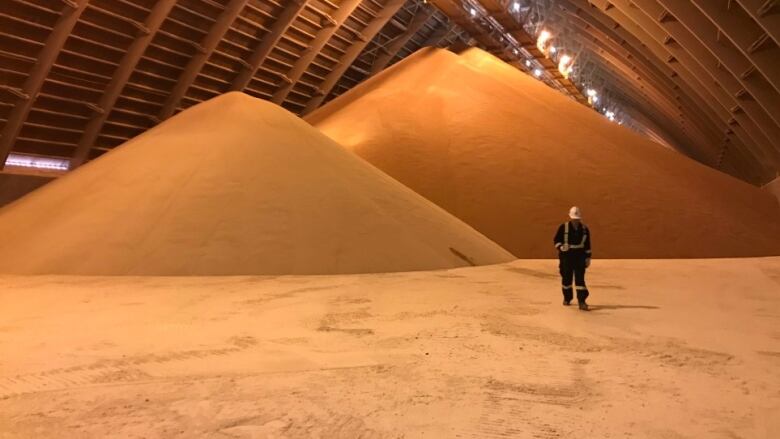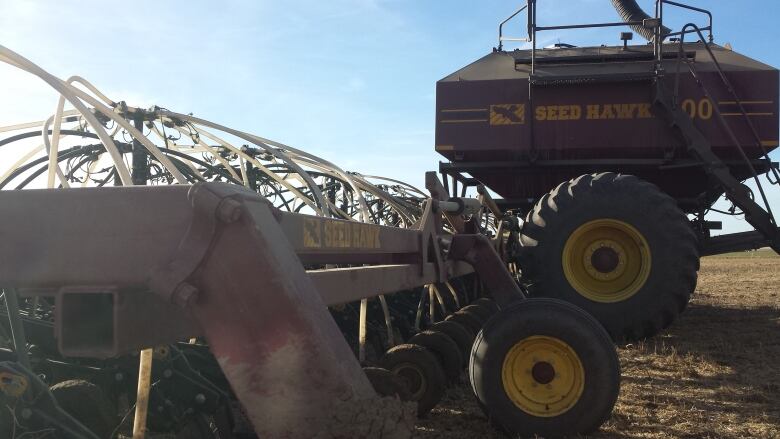How COVID-19 is affecting the bottom line in Sask.'s biggest industries
Association rep says oil facing most immediate job losess

Saskatchewan's biggest industries are forging ahead with limited impact in the face of COVID-19, but are paying keen attention to its long-term effects.
Potash and uranium mines are taking precautions with staff, but spokespeople with Nutrien and Cameco, the biggest players in both industries in the province, say there have been no disruptions to production.
Spring seeding hasn't started in agriculture yet, but there are long-term repercussions that could hit next month.
In the short term, oil has been the hardest hit.
Oil
Oil prices plummeted early last week.
There were other factors causing the dip that were unrelated to coronavirus, but as the disease has spread there are new major pressures on the industry.
Airline flights across the world have been slashed and people are travelling less, which means less demand for fuel, said Brad Herald, vice-president of Western Canada operations for Canadian Association of Petroleum Producers.
"People look at their budgeting for kind of 2020 and beyond and a number of companies announced reductions in their capital spending almost immediately. We expect that pressure to continue," he said.
For now, it looks like the impact will be manual labourers losing jobs, Herald said.
"I haven't heard of any head office reductions but when they reduce spending in the field that's going to have an immediate effect on drilling and [new well] completions, abandonments. That's the places we spend money."
Agriculture
Bans on temporary foreign workers coming into the country means that farmers could be without extra help within the next few weeks.
Many producers have workers from Australia, Ukraine and other countries who start arriving for spring speeding as early as April, said Todd Lewis, a Regina-area farmer and president of the Agricultural Producers Association of Saskatchewan.
"I think we need to see some moves by the province and federal government to try and address that," Lewis said.

Potash
As for potash, Nutrien's Will Tigley said that as a company that answers to international markets, the show must go on.
He said one needs to look no further than the food flying off the shelves at local grocery stores to see that crops still need to planted to replenish the food supply.
"The world doesn't stop. Food still needs to get to the table and we play an important role in ensuring that happens through our business and like fertilizer and ag retail," Tigley said.
"We can limit our exposure to other people and we're doing that where we can throughout our business. There's just some necessities you can't avoid."
Tigley said Nutrien has put in measures to keep away anyone who doesn't have to be at its mines.
Uranium
Cameco, which vastly scaled back its operations in Saskatchewan in 2018, is still in full production mode at Cigar Lake.
Just last week there was a scare after federal Minister of Natural Resources Seamus O'Regan had symptoms of COVID-19 and was tested. Before then, he had visited Cigar Lake.
Still in isolation, waiting to hear from public health officials about my Coronavirus test results.
Feel fine, and the work continues. Attended Cabinet by phone today, and we announced further measures to keep the economy strong.
Will post the results as soon as I have them.
—@SeamusOReganMy COVID-19 test has come back negative, thankfully.
I will continue to watch for symptoms fever, a dry cough and I urge everyone to do the same.
Take care of yourself.
Look out for one another.
—@SeamusOReganJeff Hryhoriw, Cameco'sdirector of government relations and communications, said all people who had been in contact with O'Regan were told quickly and some chose to self-isolate. When the test came back negative, they were also told quickly, he said.
Before people fly in and out theygothrough screening in an effort to keep people from getting and transmitting COVID-19 in the remote locations, he said.
At remote sites, social distancing could be easier than it is elsewhere, said Pam Schwann, president of the Saskatchewan Mining Association (SMA).
"There's large spaces underground where you don't see any other people. The most probably concentrated time that people would be together would be in the cages going down underground and coming back up," she said.
Schwann said mine sites started limiting visitors as early as March 2, much earlier than when many other businesses took measures.
She noted that head offices and corporate environments have seen the most immediate changes. One example is an SMA committee meeting that was supposed to take place on Thursday but has since been modified so that it can be delivered remotely. The theme, decided in January is pandemic planning.












_(720p).jpg)


 OFFICIAL HD MUSIC VIDEO.jpg)
.jpg)



























































































